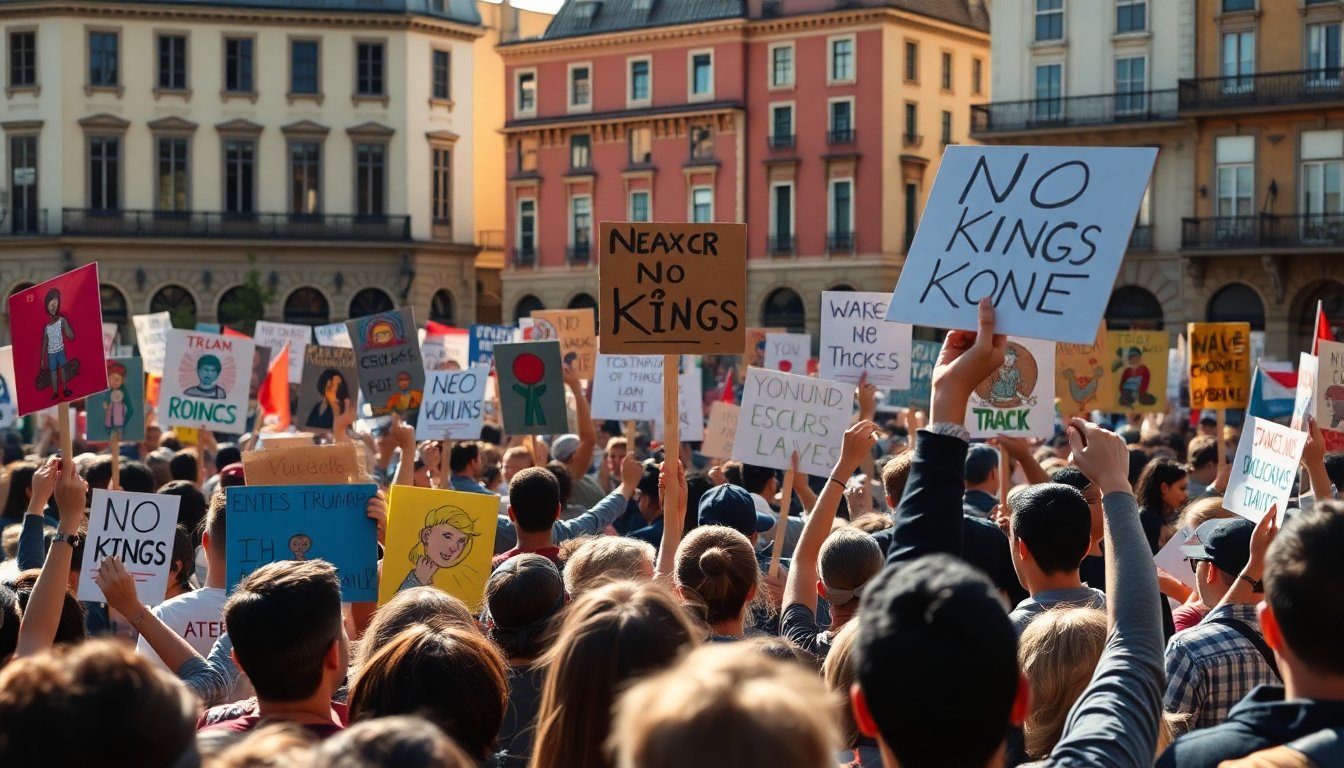Table of Contents
In a significant display of civic engagement, citizens across the United States have organized more than 2,600 protests collectively branded as the “No Kings” demonstrations. These gatherings respond to President Donald Trump’s controversial policies on immigration, education, and public safety. A diverse coalition of advocacy groups leads the events, mobilizing individuals in cities of all sizes from coast to coast.
This weekend’s rallies mark the third large-scale mobilization since Trump resumed his presidency. They occur amidst a prolonged government shutdown that has disrupted federal services and raised concerns about the balance of power between the executive branch and other government entities. Organizers have expressed alarm at what they perceive as a troubling shift towards authoritarian governance.
Global solidarity and local action
The wave of protests has transcended American borders, with initial gatherings taking place outside the U.S. For instance, in London, several hundred demonstrators gathered outside the American embassy, while similar protests occurred in Madrid and Barcelona. By Saturday morning, Northern Virginia saw a surge of participants walking over overpasses toward Washington, D.C., signaling a determined effort to make their voices heard.
Many participants are particularly incensed by the rhetoric surrounding their motivations for protesting. In Bethesda, Maryland, one demonstrator displayed a sign proclaiming, “Nothing is more patriotic than protesting,” highlighting the belief that dissent is a fundamental expression of democracy. Meanwhile, President Trump, currently at his Mar-a-Lago estate in Florida, has dismissed the protesters’ claims, stating in a recent Fox News interview, “They say they’re referring to me as a king. I’m not a king.”
Mobilizing for change
With over 2,600 events scheduled, organizers assert that this series of protests fosters a more cohesive opposition movement compared to previous demonstrations. Prominent political figures, including Senate Majority Leader Chuck Schumer and Independent Senator Bernie Sanders, are voicing resistance to Trump’s administration. They aim to counteract alleged infringements on free speech and the aggressive nature of immigration enforcement under his leadership.
The power of collective action
Ezra Levin, a co-founder of the advocacy group Indivisible, articulated the sentiment behind these protests, stating, “There is no greater threat to an authoritarian regime than patriotic people-power.” Early in the day, thousands gathered in New York City’s iconic Times Square, chanting, “Trump must go now,” exemplifying the urgent call for political change.
The American Civil Liberties Union (ACLU) has played a pivotal role in these protests by providing legal training to tens of thousands of individuals who will serve as marshals during the marches. This training includes essential skills in de-escalation, ensuring that the protests remain peaceful and orderly, further emphasizing the movement’s commitment to lawful assembly.
Political backlash and differing perspectives
Despite widespread support for the protests, Republican leaders have sought to characterize the rallies as outliers within the broader political discourse. They have attributed the ongoing government shutdown, which has persisted for 18 days, to the actions of rally participants, labeling them as “communists” and “Marxists.” House Speaker Mike Johnson criticized the protests, dubbing them the “Hate America rally” and questioning the motives of those involved.
In response to these accusations, Bernie Sanders took to social media, framing the rallies as “love America” demonstrations, underscoring the participants’ commitment to core democratic values. Dana Fisher, a professor at American University, projected that this Saturday could witness one of the largest protest turnouts in recent history, estimating that upwards of 3 million individuals might participate based on registration data.
A movement of solidarity
Fisher noted the significance of these protests lies in their ability to foster a sense of collective identity among individuals who feel marginalized or threatened by the current administration’s policies. While these demonstrations may not immediately alter Trump’s policies, they hold the potential to empower elected officials across various levels of government who oppose his agenda, galvanizing a broader movement for change.


